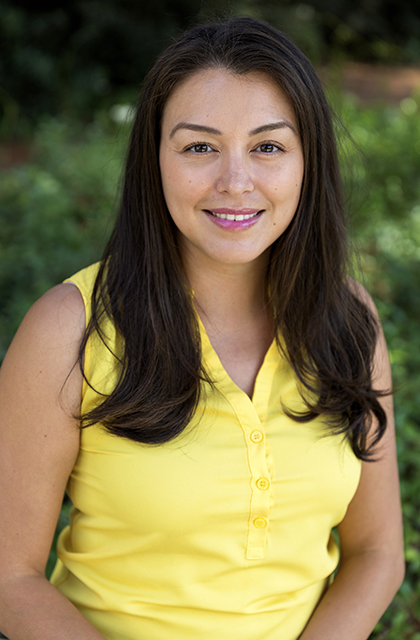Aug. 6, 2020 — California State University Channel Islands (CSUCI) Associate Professor of Mathematics Selenne Bañuelos, Ph.D., remembers walking into her college math classes as an undergraduate and seeing no other women of color as tenure track faculty nor Latinx women born in the U.S.
“The STEM (science, technology, engineering and math) world can be very lonely for women, especially for a woman of color,” Bañuelos said. “You can feel like you don’t fit in. At that moment, I had not met a female in academia — especially a woman with children.”
But a love for the complexity and possibilities of mathematics compelled her to keep going, and in late July, the Mathematical Association of America (MAA) awarded Bañuelos one of the top awards in the nation for a university math professor.
Bañuelos took home the Henry L. Alder Award for Distinguished Teaching, which honors beginning college or university faculty whose teaching of undergraduate mathematics has been extraordinarily successful. Bañuelos was one of three teachers in the nation selected to receive a 2020 Alder teaching award.
“In just over five years of full-time teaching, Dr. Bañuelos has achieved significant levels of influence on students of mathematics across multiple institutions, as well as on colleagues both at her home institution, county-wide, and across the country,” wrote Professor of Mathematics Cynthia Wyels, Ph.D., in a nominating letter. “In fact, were Dr. Bañuelos to step away from teaching now, the widening spheres of influence she has already set in motion would continue for years to come.”
Bañuelos is campus lead for a five-year $6 million grant from the U.S. Department of Education to help Latinx and students graduate with majors in STEM. The grant was also aimed to help students whose income qualified them for financial aid.
Among the barriers discouraging many students were Pre-Calculus, Calculus I and Calculus II classes, with about 40% of students failing nationwide — roughly the same rate as at CSUCI. Mastery of these classes is a pre-requisite to majoring in one of the STEM fields.
So, Bañuelos helped design an intensive two-year long professional development program for mathematics faculty at CSUCI, as well as at all four regional community colleges, all of which are designated Hispanic-Serving Institutions (HSI)s.
“Given the demographics of our students, we need to make sure we are serving them well,” Bañuelos said. “Standing there lecturing is not as effective as an active learning setting.”
Sometimes it required her to challenge experienced faculty of a higher rank to reconsider their beliefs and practices, always backing her methods with solid research. From this research, Bañuelos designs classes as “culturally competent,” which means they address all styles of learning and employ methods that include all students — especially those who might have been told they just “aren’t any good at math.”
“There are three components,” Bañuelos said. “Building community, student-centered learning and rich tasks.”
First of all, Bañuelos breaks the students into groups and has them participate in an exercise designed to build trust, such as “the broken circle,” in which students each have different parts of a paper circle and must cooperate to build an intact circle without speaking or gesturing.
“If you want students to be working together in groups, they have to feel comfortable to share questions and be vulnerable,” Bañuelos explained.
Next is the “student-centered” activities in which students are encouraged to discover answers to mathematical questions themselves, rather than watch the instructor work it out on a board. The third is a so-called “rich task,” which is a more complex mathematical task in which students work together to learn new mathematical concepts.
Bañuelos also mentors undergraduates often encouraging them to present research at conferences. One of her mentees, Class of 2020 Mathematics graduate Mayleen Cortez, will be attending Cornell University this fall.
One of Bañuelos’ former students, Robben Teufel, also wrote a nominating letter illustrating her humanity and humility by sharing something that happened in class. Teufel is a second-year Applied Mathematics doctoral student at Rensselaer Polytechnic Institute in New York.
“In one of the most memorable activities, we ranked four different…proofs of the same theorem,” Teufel wrote. “After we all agreed which proof was written the best, Dr. Bañuelos revealed that the worst-ranked proof was her own from her undergraduate days. Imagine our astonishment: the brilliant mathematician in front of us once wrote proofs at our level.”
Then Teufel added: “She serves as one of my greatest inspirations as a mathematician, educator, mentor, and most importantly, as a person.”
